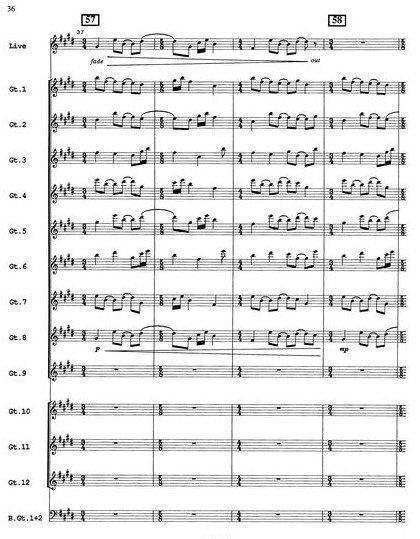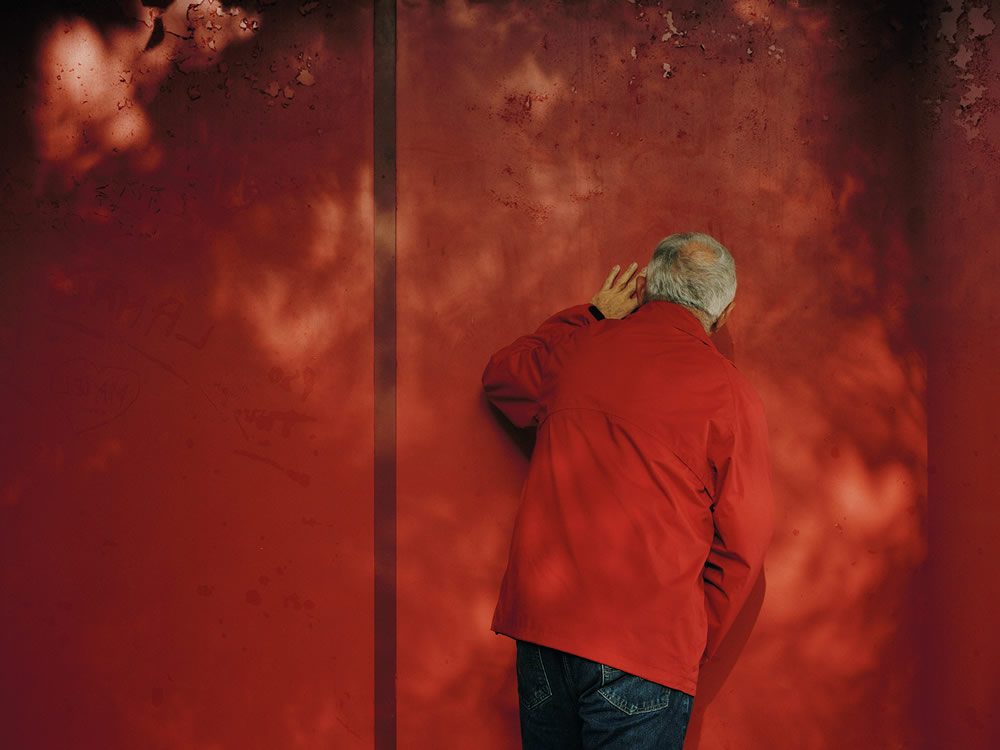After a long facebook chat about last weeks article I’m feeling inclined to talk a bit about counterpoint, or to use the title of the Bach piece I link to later “Contrapunctus” – which I like as it sounds like a method of torture.
It really just means when more than one melodic line is played – with some kind of contrast between the two – ideally they should complement each other musically.
There are millions of possibilities for how to use this sort of effect – one is commonly used in minimalist music where you might have a melody played by various instruments starting at different times, or altered so they are longer or shorter than the original and so start to move out of time against each other. This is known as phasing and is common in Steve Reich’s works. Interestingly, his work is often thought to be simple (just stuff repeating), although taking a quick glance at almost any one of his scores suggests an awful lot of work, knowledge, intuition and ability:
Electric counterpoint

(I suspect many a guitarist has looked into playing this and been defeated by the scale of the endeavour…)
J.S. Bach came up in the chat I had last week, and indeed he was a master of intertwining melodies. In fact he wrote many pieces to explore the idea of what can be done with this concept:
I regard writing fine counterpoint as a bit of a lost art. In some ways it’s largely redundant in todays music, where single ideas right up front are generally king. This is not any kind of rant about the “decline of music” or anything, simply that I really enjoy this kind of style, it’s intricate and fascinating – and with infinite possibilities to play with, it’s a lifetimes work of investigation.
Reich has obviously enjoyed huge success, and indeed the word “counterpoint” figures in some of his titles, and could well some up the focus of his style, so I don’t think the enjoyment of this art is lost by any means.
In fact you could even describe a track like this, by Squarepusher:
As contrapuntal (which for those non-theory types out there is the word i need to use as there is no real English equivalent: it’d need to be something like “counterpointal” which doesn’t sound right). Although I like this tune, the counterpoint is not as interesting to me as it seems to be more or less improvised…you let it wash over you and enjoy each moment as it goes past, but there is not much internal logic to it as far as I can tell, there’s no trail to follow, which is part of the enjoyment of good contrapuntal music.
Bach’s music in particular is beloved by an odd assortment of people. It seems to really appeal to the intellect, attracting rather stuffy types (who I have a soft spot for, despite the stuffiness), but many people are draw to it’s emotional appeal (and the metallers seem to love playing it on the guitar!) despite it’s mathmatical qualities…
Some might see it as an overly-intellectual aspect of music, and it is removed from purely good-time music, but as there is nothing wrong with music for the heart, similarly there is nothing wrong with music for the head! When a piece makes an impression on both is when I’m a happy listener.
About Dave.
David Learnt composition (harmony, counterpoint and orchestration) to degree level through studying Schoenbergs Fundamentals of Musical Composition. He is a founder member of Avant Pop duo Cnut, and orchestral doombience outfit Regolith.
Make Better Music is updated every Tuesday. For previous articles search for ‘Dave Graham’
Image: Francesco Marino / FreeDigitalPhotos.net

David Learnt composition (harmony, counterpoint and orchestration) to degree level through studying Schoenbergs Fundamentals of Musical Composition, the classic text on twentieth century harmony by Vincent Persichetti, Henry Mancini’s Sounds and Scores, Rimsky-Korsakov’s excellent books on orchestration as well as studying any scores that intrigued me. He is a founder member of two bands, avant pop duo Cnut, and orchestral doombience outfit Regolith, and have performed across Europe with them.



















